


HAPPY NAME DAY ONCE AGAIN
TO OUR BELOVED BENEDICT XVI
Thurssday, July 11, 14th Week in Ordinary Time
MEMORIAL OF ST. BENEDICT, Abbot

 ST. BENEDICT (BENEDETTO DA NURSIA) (Italy, 480-547), Father of Western Monasticism, Co-Patron of Europe
Benedict XVI dedicated his catechesis on April 9, 2008, to St. Benedict.
ST. BENEDICT (BENEDETTO DA NURSIA) (Italy, 480-547), Father of Western Monasticism, Co-Patron of Europe
Benedict XVI dedicated his catechesis on April 9, 2008, to St. Benedict.
www.vatican.va/holy_father/benedict_xvi/audiences/2008/documents/hf_ben-xvi_aud_20080409...
For more of Benedict XVI and St. Benedict, read the accounts and commentaries on the Pope's visit to Cassino and the abbey of Monte Cassino on Ascension Sunday, May 24, 2009, on one of the earliest pages of this thread:
benedettoxviforum.freeforumzone.leonardo.it/discussione.aspx?idd=852...
Readings for today's Mass:
www.usccb.org/bible/readings/071113.cfm
AT THE VATICAN, JULY 11, 2013
No events announced for Pope Francis today.
However, there were two important administrative statements from the Vatican:
COMMUNIQUÉ OF THE HOLY SEE PRESS OFFICE:
MOTU PROPRIO OF POPE FRANCIS ON CRIMINAL LAW MATTERS,
AMENDED CRIMINAL LAW PROVISIONS AND ADMINISTRATIVE SANCTIONS
IN VATICAN CITY STATE AND THE HOLY SEE
1. Today His Holiness Pope Francis has issued a Motu proprio on criminal law matters.
On this same date, the Pontifical Commission for Vatican City State has adopted the following laws:
- Law No. VIII containing Supplementary Norms on Criminal Law Matters;
- Law No. IX containing Amendments to the Criminal Code and the Criminal Procedure Code;
- Law No. X containing General Provisions on Administrative Sanctions.
2. The Motu proprio makes the criminal laws adopted by the Pontifical Commission for Vatican City State applicable also within the Holy See.
3. The criminal laws adopted today are a continuation of the efforts to update Vatican City State’s legal system, building upon the measures adopted since 2010 during the pontificate of Benedict XVI.
4. These laws, however, have a broader scope, since they incorporate into the Vatican legal system the provisions of numerous international conventions including: the four Geneva Conventions of 1949, on the conduct of war and war crimes; the 1965 Convention on the elimination of all forms of racial discrimination; the 1984 Convention against torture and other cruel, inhuman or degrading treatment or punishment, the 1989 Convention on the rights of the child and its optional protocols of 2000.
5. Of particular note in this context is the introduction of the crime of torture and a broader definition of the category of crimes against minors (including: the sale of children, child prostitution, the recruitment of children, sexual violence and sexual acts with children, and the production and possession of child pornography).
6. A section of the legislation introduces a list of crimes against humanity, in particular, the crimes of genocide and apartheid, following broadly the definitions adopted in the 1998 Statute of the International Criminal Court. The section of the Criminal Code regarding offences committed in the exercise of public administration has also been revised in light of the 2003 United Nations Convention against corruption. With regard to penalties, that of life imprisonment has been abolished and it has been replaced with a maximum penalty of 30 to 35 years of imprisonment.
7. In line with the most recent developments at the international level, the new legislation also introduces a system of penalties for juridical persons who profit from the criminal activities of their constituent bodies or personnel, establishing their direct liability and providing as penalties a set of interdictions and pecuniary sanctions.
8. In the area of criminal procedure, the general principles of presumption of innocence and due process within a reasonable time have been recognized explicitly, while the power of the judicial authorities to adopt precautionary measures has been increased by bringing up to date the provisions for confiscation and the freezing of assets.
9. Also of importance is the modernization of the rather dated norms governing international judicial cooperation, with the adoption of measures in line with the standards of the most recent international conventions.
10. The law on administrative sanctions is of a general nature so as to serve as a common framework that provides for the possibility of sanctions in different areas intended to promote respect for the norms, to render them effective and to protect the public interests.
11. As a whole, these normative efforts form part of broader process aimed at modernizing further the Vatican legal system with a view to enhancing its consistency and effectiveness.
Not that it matters, but obviously, these changes did not just spring full-blwon in the past four months but have been under study in the previous Pontificate, not initiated in the current one.
 One year ago...
One year ago...
Benedict XVI was honored with a concert in Castel Gandolfo tonight by the West Divan Youth Orchestra led by the Argentine-Israeli maestro Daniel Barenboim, in a performance of Beethoven's symphonies #5 and #6
in the inner courtyard of the Apostolic Palace in Castel Gandolfo. The added news is that Italian President iorgio Napolitano was a special guest and dined with the Pope afterwards.
The Vatican released a communique today on the extraordinary meeting held in Rome yesterday, July 10, of the Islamic-Catholic Liaison Committee, which agreed this time next year for their regular meeting on the topic of a common front by believers in the face of materialism and secularism.
 CONCERT IN CASTEL GANDOLFO -
CONCERT IN CASTEL GANDOLFO -
Italian President Napolitano
is the Pope's special guest
July 11, 2012
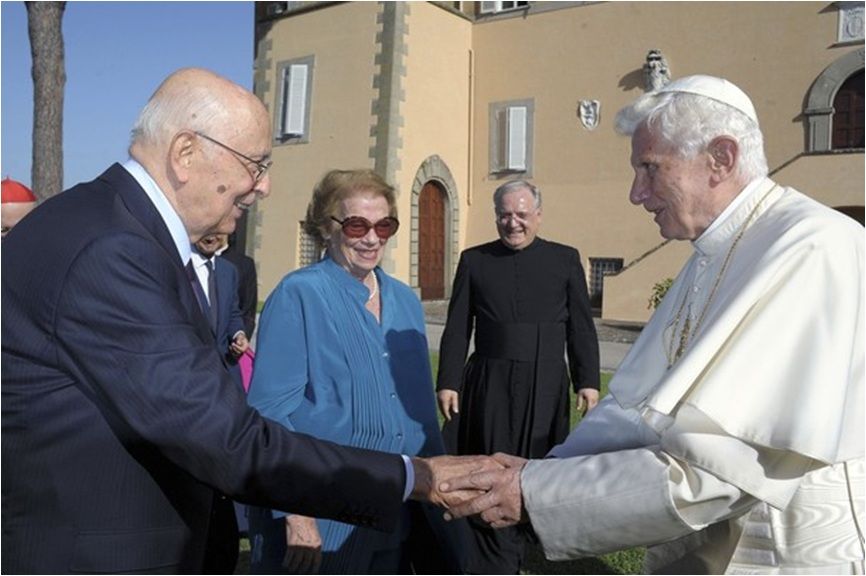
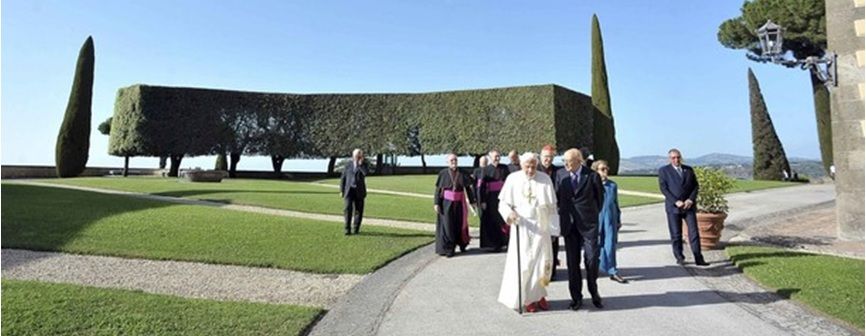
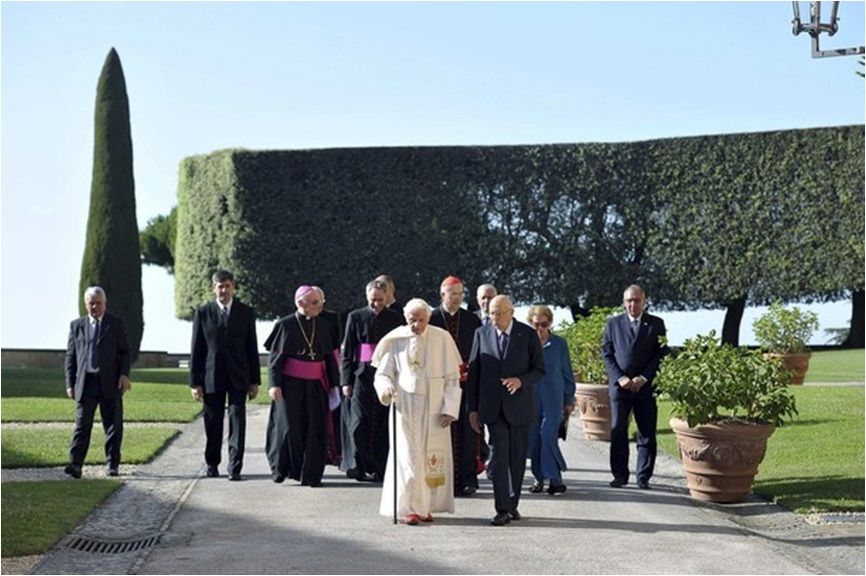
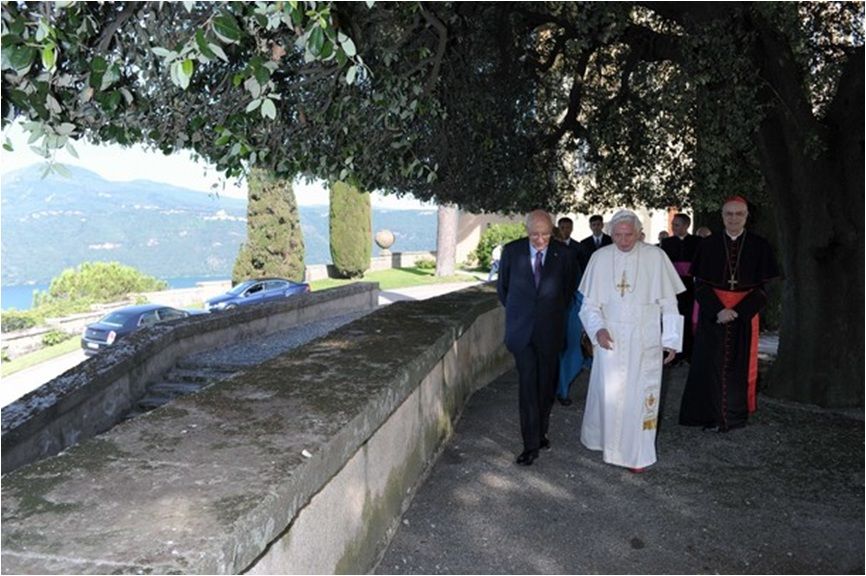
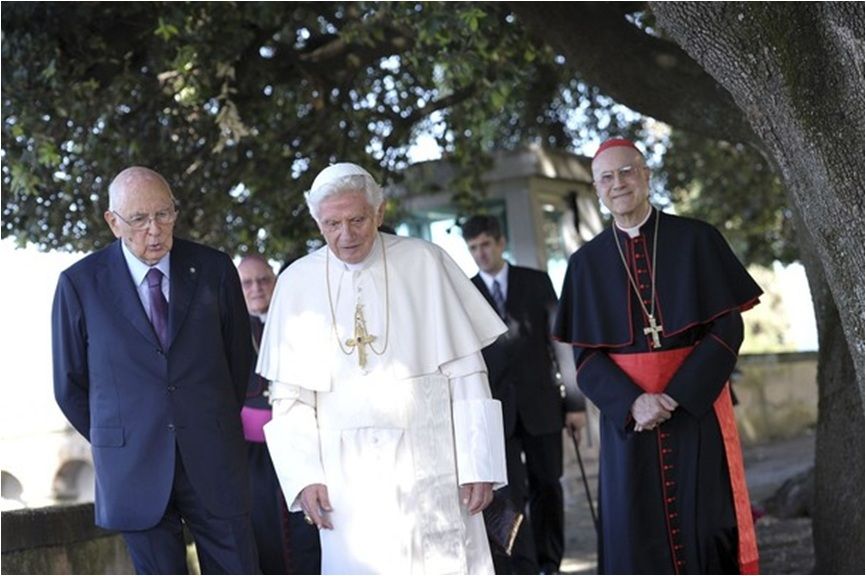
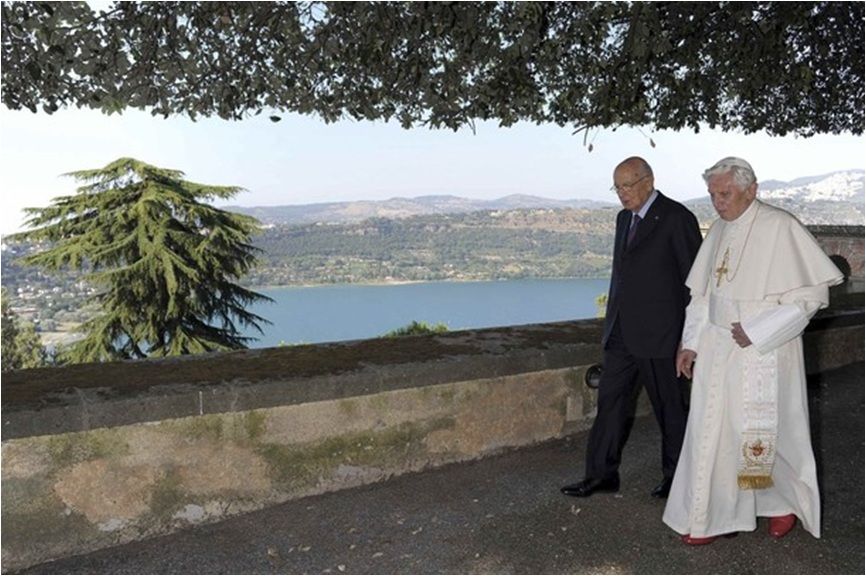

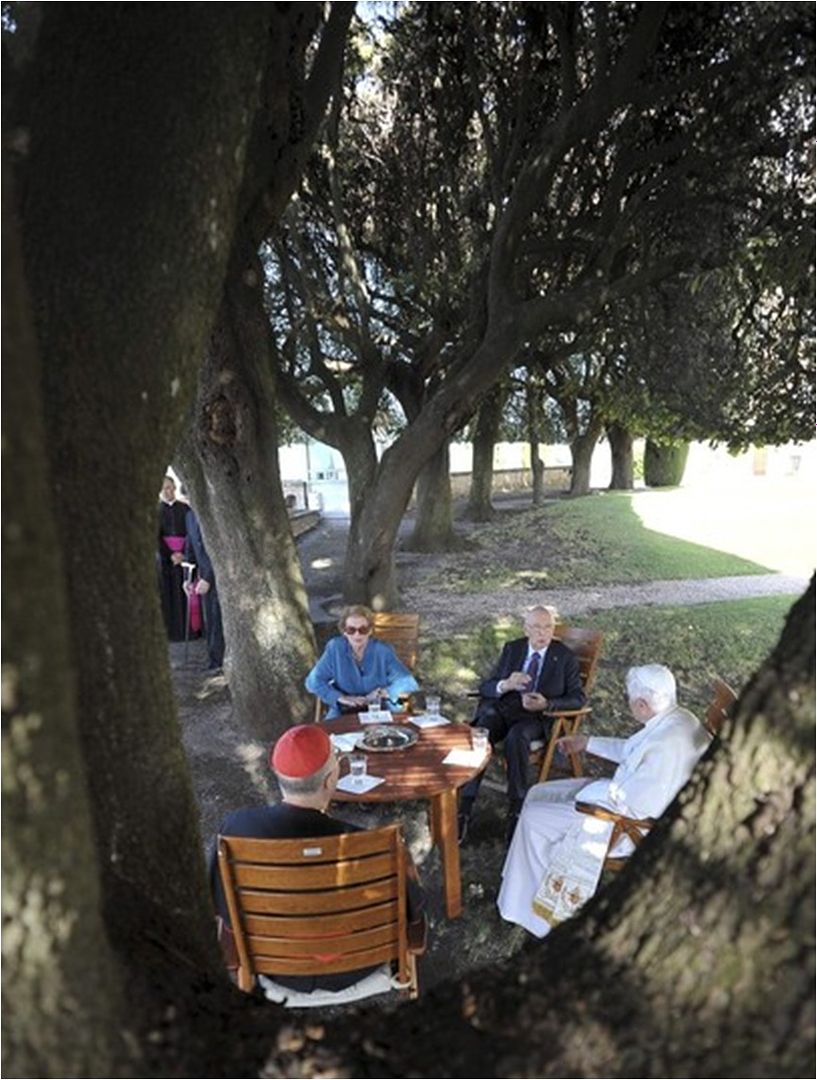 'Symphony of peace
'Symphony of peace
among peoples'

July 11, 2012
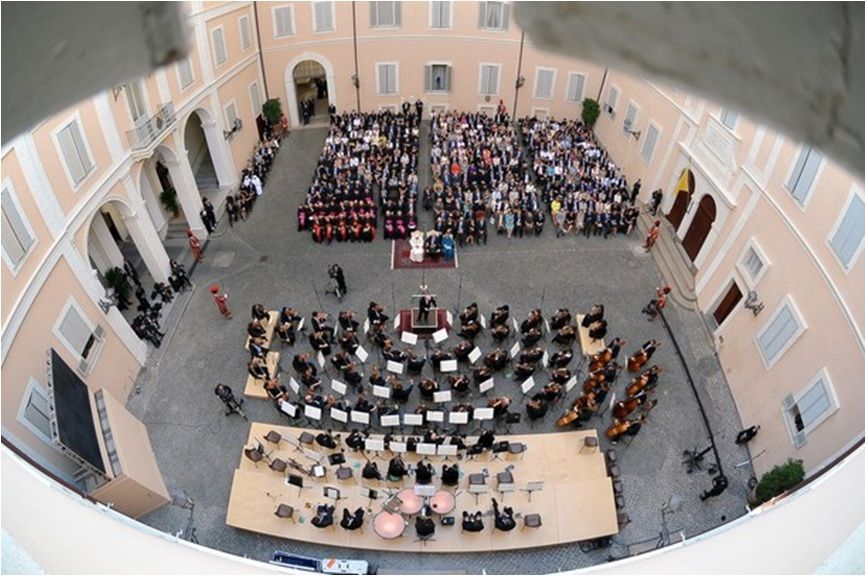
“We must strive to achieve peace, leaving aside violence and weapons, engaging ourselves in personal and communal conversions, through dialogue, in a patient search for an understanding that is possible”, Pope Benedict XVI said, after the concert given by the West-Eastern Divan Orchestra, in Castel Gandolfo Wednesday evening, playing Beethoven's Fifth ('Eroica') and Sixth ('Pastorale') symphonies for the Holy Father and his special guests, Italian President Giorgio Napolitano and his wife Clio. Emer McCarthy reports:
The concert by this unique orchestra of musicians from Israel, Palestine and other Arab nations, began as the sun set over the courtyard of the Apostolic Palace in Castel Gandolfo. It was a special treat for Pope Benedict, on the feast of St. Benedict, organized by Cardinal Gianfranco Ravasi of the Pontifical Council for Culture with the patronage of Italian President Giorgio Napolitano who was present Wednesday evening, seated alongside the Pope.
As the last notes of the symphony died on the evening air, and Maestro Daniel Barenboim bowed before a standing ovation, Pope Benedict addressed those gathered, praising the foresight of the Argentine-born Israeli Maestro, who, together with the late Edward Said – a Palestinian intellectual and accomplished pianist – founded the orchestra to give the children of Israeli and Arab communities a vehicle to look beyond their differences.
Pope Benedict spoke of “the great symphony of peace between peoples, which is never completely accomplished”, remembering how his generation and that of Maestro Barenboim's parents, “experienced the tragedies of World War II and the Holocaust”. The Pope concluded by thanking the young men and women of the Orchestra and Maestro Barenboim, for being living witnesses to the fact that peace and understanding – beyond differences and divisions – are possible and must by everyone’s common goal.
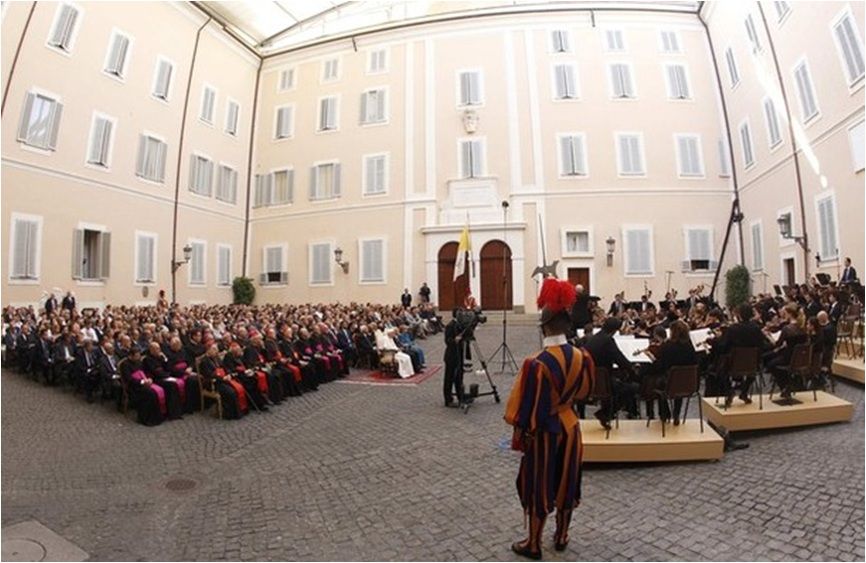
Here is a translation of the Pope's remakrs after the concert:
Mr.President,
Venerated Brothers,
Ladies and Gentlemen:
We have just lived through an experience of listening that was intense and enriching for our spirit, and for this, let us give thanks to the Lord.
I wish to express my sincere appreciation to Maestro Daniel Barenboim and all the musicians of the West-Eastern Divan Orchestra which, during their summer tour, generously offered me this concert on the feastday of St. Benedict.
Thus they have not only allowed me to enjoy their optimal performance 'live', but also to participate more directly in their story, which began around 13 years ago, with you, Maestro, and with the late Edward Said.
I greet most cordially the President of the Italian Republic, the Honorable Giorgio Napolitano, whom I thank for his presence and for having encouraged this initiative.
And my thanks also to Cardinal Ravasi, who introduced this concert with three beautiful and significant citations.
To the other authorities, and to all of you, dear friends, I extend my greeting.
You can imagine how glad I was to welcome an orchestra like this, which was born from the conviction - or the experience - that music unites persons beyond any division, because music is the harmony of differences, which happens whenever a concert beings, with the ritual of 'tuning together'.
From the multiple timbres of different instruments, a symphony can emerge. But this does not occur magically nor automatically! It happens only thanks to the engagement of the conductor and of every single musician. An engagement that is patient, effortful, that requires time and sacrifice, in the work of listening to each other reciprocally, avoiding excessive protagonism in favor of the greater success of the ensemble.
While I express these thoughts, the mind turns to the great symphony of peace among peoples, which is never ever complete. My generation, and that of Maestro Berenboim's parents, lived through the tragedies of the Second World War and the Shoah.
It is very significant that you, Maestro, after having reached the highest goals for a musician, wished to give life to a project like the West-Eastern Divan Orhestra - a group in which Israelis, Palestinians and other Arabs perform together - persons of Jewish, Muslim and Christian religions.
The numerous acknowledgments with which you and this orchestra have been honored demonstrate, at the same time, professional excellence as well as ethical and spiritual commitment. And we heard that tonight, listening to the Fifth and Sixth Symphonies of Ludwig van Beethoven.
Even in this program choice, this pairing of the two symphonies, we can see a most interesting significance. This two highly celebrated symphonies express two aspects of life: tragedy and peace, man's struggle against adverse destiny and the reassuring immersion in a bucolic atmosphere.
Beethoven worked on these two compositions, particularly on their completion, almost contemporaneously. Such that they were performed for the first time together - as they were tonight - in a memorable concert on December 22, 1808 in Vienna.
The message that I wish to draw today is this: To achieve peace, it is necessary to be committed, putting aside violence and weapons, to be committed to personal and communitarian conversion, with dialog and a patient search for posswible agreements.
Let us therefore thank from the heart Maestro Barenboim and the West-Eastern Divan Orchestra for having given us a testimony of this way. To each of them, our wish and prayert that they may continue to dissiminate in the world the hope for peace through the universal language of music.
Thank you and a good evening to all.
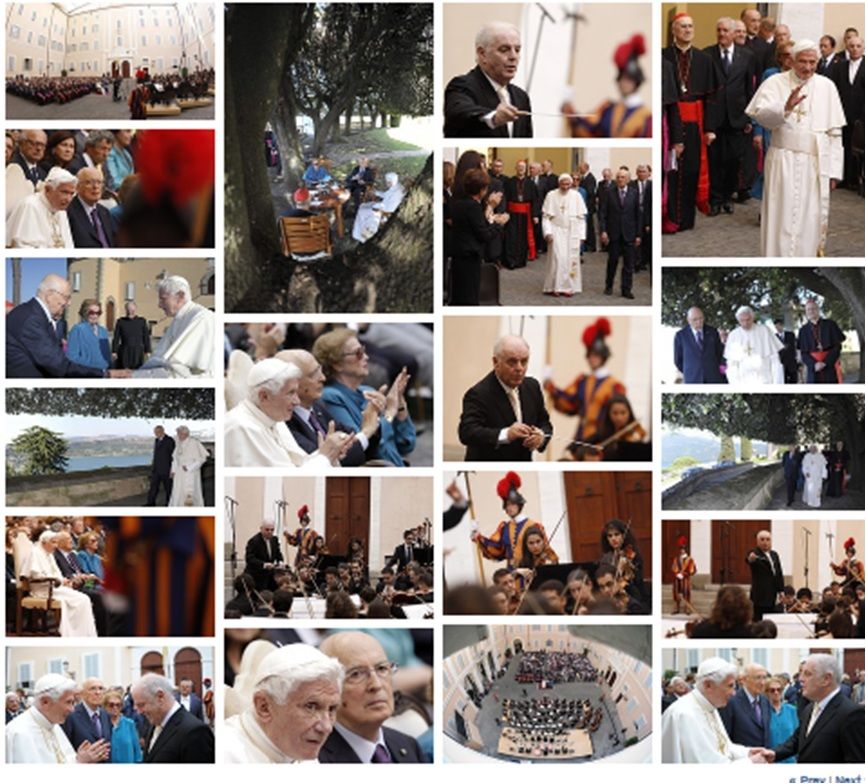
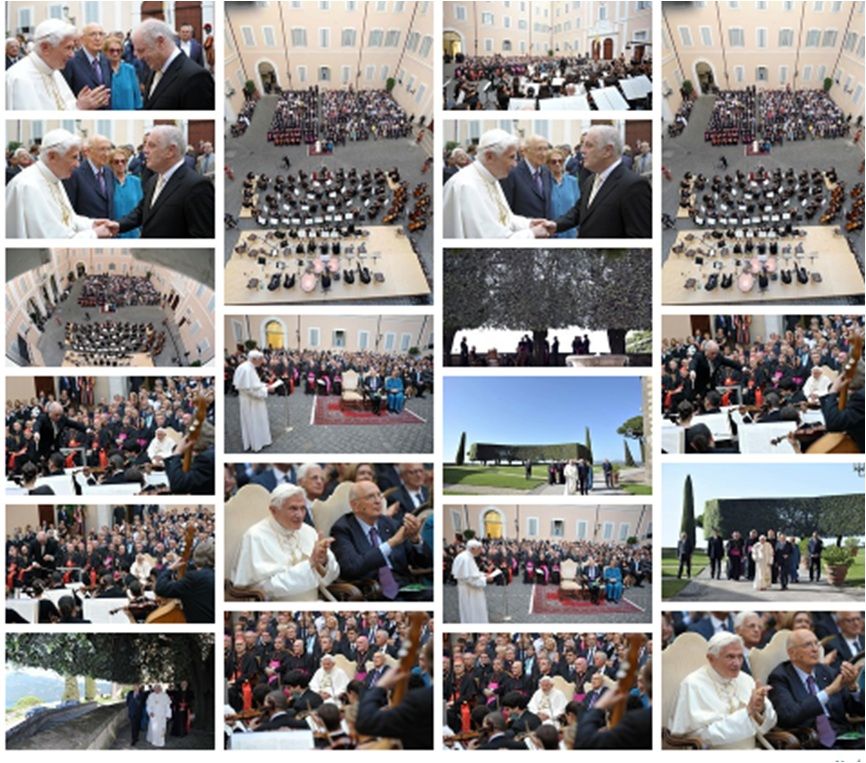

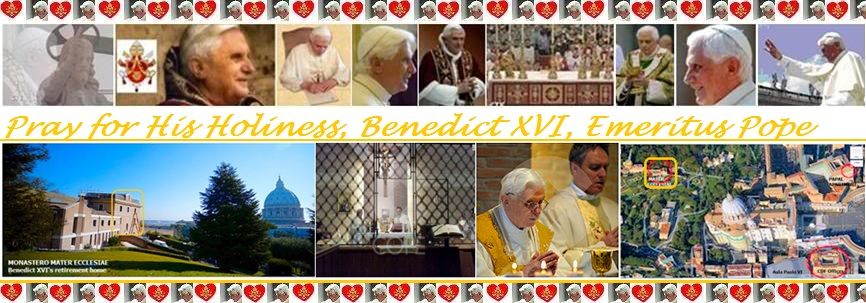
[Modificato da TERESA BENEDETTA 13/07/2013 13:20]